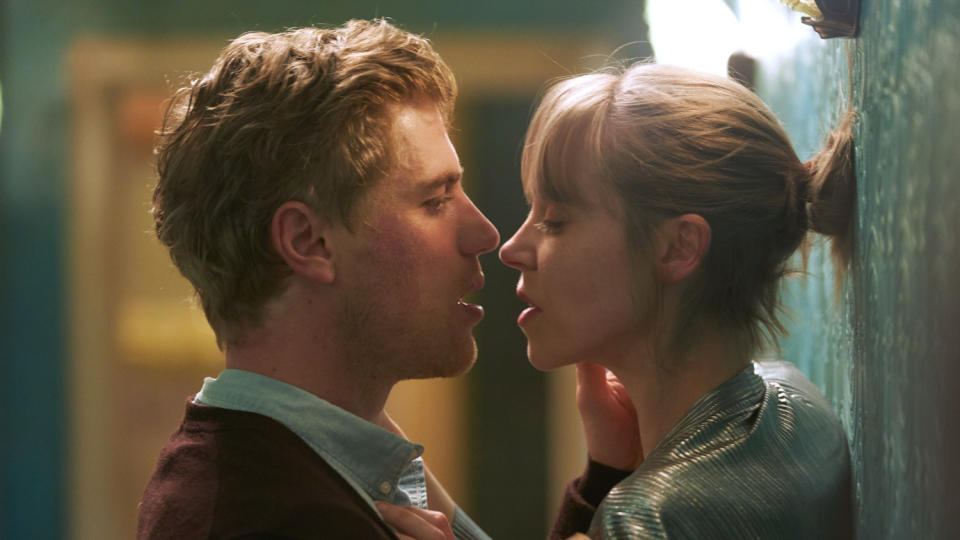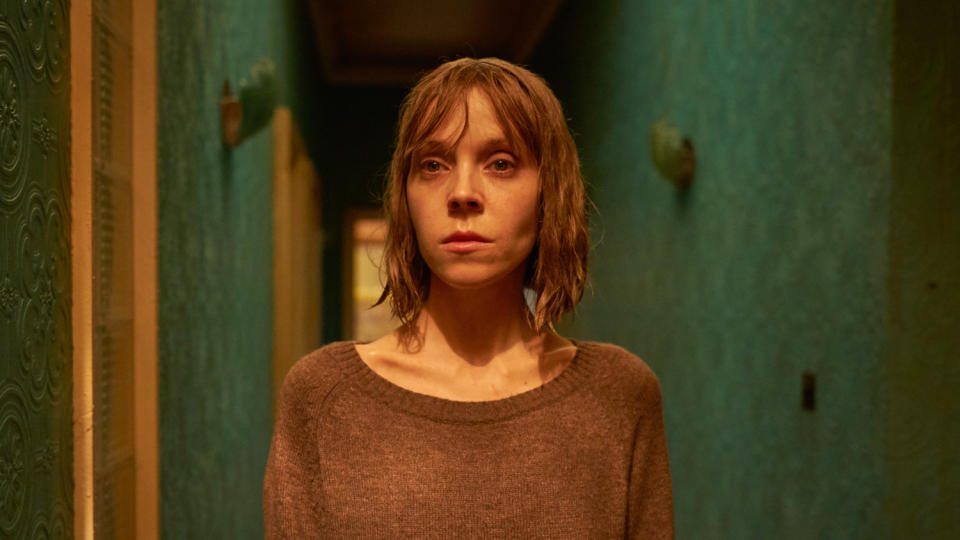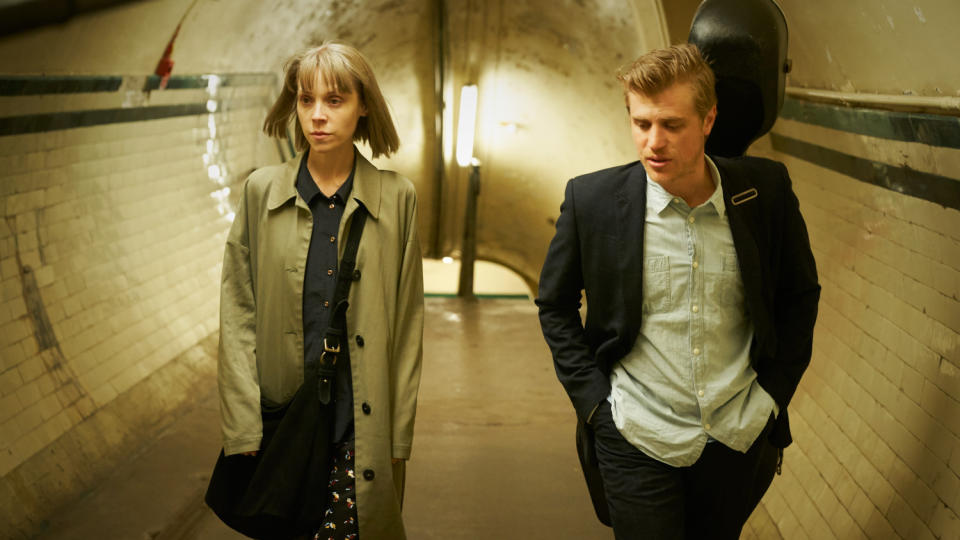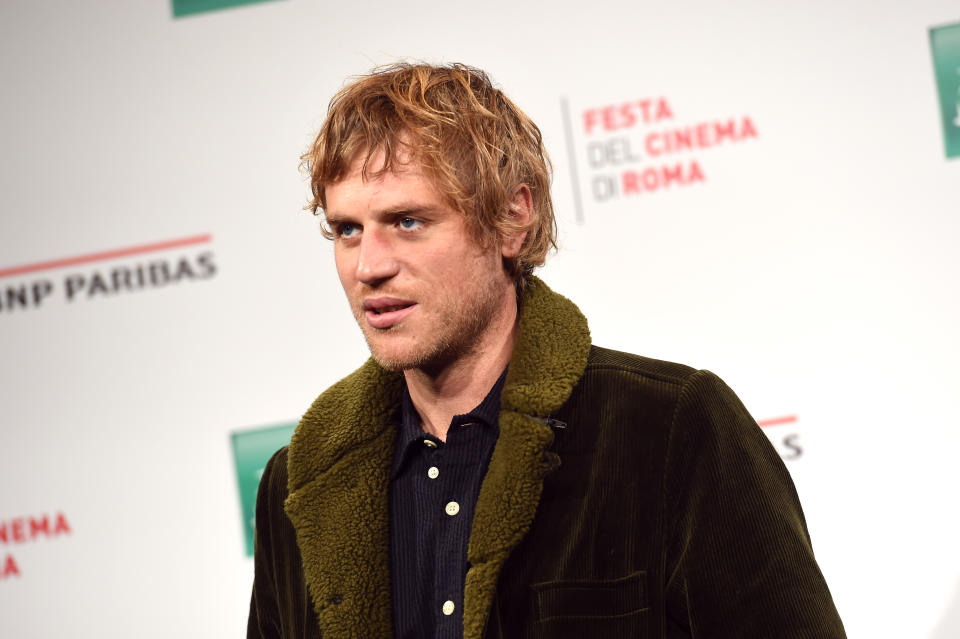Johnny Flynn on how thriller 'Cordelia' became perfect for the UK's year of isolation (exclusive)
Watch: Trailer for London thriller Cordelia
Johnny Flynn believes new thriller Cordelia has “a resonance with the strangeness of what’s happening now”, given its isolated setting within a pair of London flats.
Flynn plays cellist Frank, who forms a strange bond with downstairs neighbour Cordelia (Antonia Campbell-Hughes) while she deals with a trauma, having been left at home alone by her twin sister.
Read more: Clip of Johnny Flynn as David Bowie in Stardust
The 37-year-old actor and musician told Yahoo Movies UK that the movie has gained extra relevance since it was shot in a Twickenham studio.
“I watched a very early cut and then I watched it again recently. I sensed a resonance with the strangeness of what’s happening now,” he said.
“That experience that she’s having in the flat is now similar to what a lot of people are going through, especially if they live on their own. So that’s very pertinent.”

Flynn added: “It also reflects these times we live in, in terms of things not being black and white at the moment and humanity facing up to certain moral quandaries about itself.
“It’s dealing with trauma and isolation, which is particularly poignant now. But this thing about trauma and how it affects our vision on situations is something I’m fascinated with.”
Read more: Doug Liman shooting COVID-19 thriller Lockdown
Cordelia is directed by Funny Cow filmmaker Adrian Shergold, who co-wrote the script with leading lady Campbell-Hughes.
It’s a strange psychological thriller that smashes together past and present in terms of its unusual interior design, to the extent that many assumed the movie was a period drama when the first poster was unveiled.

“The poster is such a strong choice because it played with people’s ideas of how things should be,” said Flynn.
“Normally in that situation, it’s the man pinning the woman to the wall and so I loved that about that image.
“I liked the way the scene was shot for that reason. It just physically felt like a bit of a dance and there’s this power play in the story, which that poster alludes to.”
Read more: Edgar Wright unveils London-set horror Last Night in Soho
Cordelia is now set to be released into cinemas in the UK and Ireland just ahead of Halloween, though Flynn dismissed the idea the film was a horror.
He described the movie as “swimming in the murky cross-section of all of those Venn diagrams” when it comes to genre.
Read our full interview with Johnny Flynn, in which he tries to wriggle out of describing the movie, discusses his cello playing or lack thereof and looks back on making Beast with Jessie Buckley...

Yahoo Movies UK: Cordelia is a fascinating film and I find myself thinking about it a lot. Obviously it’s a film about isolation, which is more relevant than you could possibly have seen coming while you were making it.
Johnny Flynn: Yeah, that’s true and I hadn’t really reflected on that. I watched a very early cut and then I watched it again recently. I sensed a resonance with the strangeness of what’s happening now. That experience that she’s having in the flat is now similar to what a lot of people are going through, especially if they live on their own. So that’s very pertinent.
I’ve been trying to describe this film to people since I saw it and I’ve found it very difficult. What do you say if you’re asked to describe it?
I try to wriggle out of it. But for you, I’ll try, I think it’s unplaceable in lots of ways, which is what attracted me to it. There’s something very strange and other about it. I’m bored of this thing about being able to say it’s a horror film or it’s a thriller or whatever. It’s quite nice that the different emotional aspects of storytelling can collide with each other and I think that’s what’s exciting about this. Everything is being flipped all the time — your sense of what’s real and what’s not, who’s trustworthy, who’s morally centred or what the hell’s going on.
I think that’s cool. I think that’s good storytelling and it also reflects these times we live in, in terms of things not being black and white at the moment and humanity facing up to certain moral quandaries about itself. It’s dealing with trauma and isolation, which is particularly poignant now. But this thing about trauma and how it affects our vision on situations is something I’m fascinated with.
In terms of describing the film, I think it explores all of those themes in a really interesting way. At times, it feels like it’s going to tip over into a horror film or a psychological thriller, but it almost never does quite go all of the way into one thing or another. I think that’s the best place for this film to exist, swimming in the murky cross-section of all of those Venn diagrams.

I like some of the visual references in terms of the set and the way it’s built. What I liked was filming a lot of it in a studio. The flat was built at Twickenham Studios. We did all of the stuff in Cordelia’s flat first and then that same room became Frank’s flat. They redressed it and everything. I felt like I was making Rear Window or something. I love all of those classic studio Hitchcock films and especially that one, which this sort of felt like a dark cousin of.
That was a thrill and so was shooting on film and working with a wonderful director and DP, as well as Antonia, who I’ve worked with before. They’re both [Adrian and Antonia] very interesting storytellers and people, who are not interested in shying away from shadows.
One of the interesting things is that the genre discussion happened in public on social media. When that poster came out, people thought it was a sort of gender dynamic flipped period romance. Obviously, that’s not what it is at all, so it was fascinating to see people have such a different view.
For that reason, the poster is such a strong choice because it played with people’s ideas of how things should be. Normally in that situation, it’s the man pinning the woman to the wall and so I loved that about that image. I liked the way the scene was shot for that reason. It just physically felt like a bit of a dance and there’s this power play in the story, which that poster alludes to.
I suppose the film mostly, in terms of genre and what it is, reminds me of Harold Pinter. He’s probably my favourite playwright and is one of the main reasons why I’m an actor, because I discovered his plays as a teenager and have acted in some of them. It’s to do with this moral ambiguity and things never quite being what they seem and shifting truths. Cordelia is brilliantly written and I loved making it.
It has this bizarre clash between looking old-fashioned and very modern. In the flats, it could be a period film but, outside, it’s the London we know today.

That’s paying homage to the fact that a lot of London, behind closed doors, still does look like it looked 30 or 40 years ago. Adrian was very careful in dressing the sets and directing the art direction to make sure that the phone is an old, dial-up phone and the flat should feel like it’s their mother’s flat and they’ve inherited it.
It’s exactly as it has been for 50 years and I loved that because it kind of adds to the sense of a haunting. It places it in all time, rather than a specific time. The claustrophobia is really inside her flat because the safe place is also the most haunted place. In public, it’s all bright and shiny, but her flat is this retiring chamber.
I think the tone is really interesting. You have this horror elements, thriller elements and then these strange comedy elements, like you chasing a cello down the steps at Covent Garden Tube Station.
Yeah, and that’s all there in Pinter as well. Adrian, being of that generation, he’s steeped in that kind of writing as well. The weirdness and the humour and the kind of awkward moments owes a lot to that era of playwrighting in the 1960s and 70s, which I love.
And I wanted to ask about that cello. Obviously, you’re a very talented musician. Is the cello something that was in your repertoire?
I’ve had a go. My son plays the cello, so I quite often pick up his, but I don’t actually play. I’ve got a cellist in my band and he just came on set. In the weeks before shooting the cello scenes, he was helping to give me some pointers and stuff. I own a cello, weirdly, because I sometimes use it for recording, but I really can’t look like I’m a proper cellist. He gave me a bit of coaching and then we had to do some body doubling, so he put on my costume and became my hands for some moments where it really needed to look like I was playing well.

I really love your work in Beast, which is a fantastic film. And as with Cordelia, it’s a film where your character is shown through the point of view of the female main character. Does that influence the way you’re playing these men, given they’re being seen from a female perspective?
Yes, I suppose so. I think in both cases, each of the characters serve a perspective of what they need to be for those heroines. They’re very different characters but, in both cases, there’s a sense of authenticity and a moving truth to them.
It’s not something you’re taught to actually play as an actor, to be an objective point of the story rather than being motivated to do things as the character, but I do like that about the stories. The fella fulfils a function in terms of the woman’s perspective and that doesn’t happen enough in storytelling. Too often, it’s the other way around. I’ve enjoyed doing that in those stories.
And there’s a little nod to Beast in Cordelia, with the poster on the Underground.
Oh, is there? I wonder if that was even intentional. I think it might have been accidental because it was just coming out at that moment. I didn’t even notice it. I know there’s one for one of Adrian’s other films, Funny Cow, which was also maybe accidental because it was coming out at the same time. But anyway, that’s funny.

Looking back on Beast and working with Jessie Buckley, how important was that film for you?
Really very important and a very special experience. It has, I suppose, opened up lots of amazing opportunities and so I’m so grateful to have been a part of it. But apart from anything, it’s just a joy to meet Jessie and [director] Michael Pearce and to make friends in those two, who have become very profound friends of mine.
I just loved it and it has been very interesting what that has led to. People seem to have connected with that film and it hit a note that people chimed with.
Cordelia will be released in UK and Irish cinemas from 23 October.

 Yahoo Movies
Yahoo Movies 
